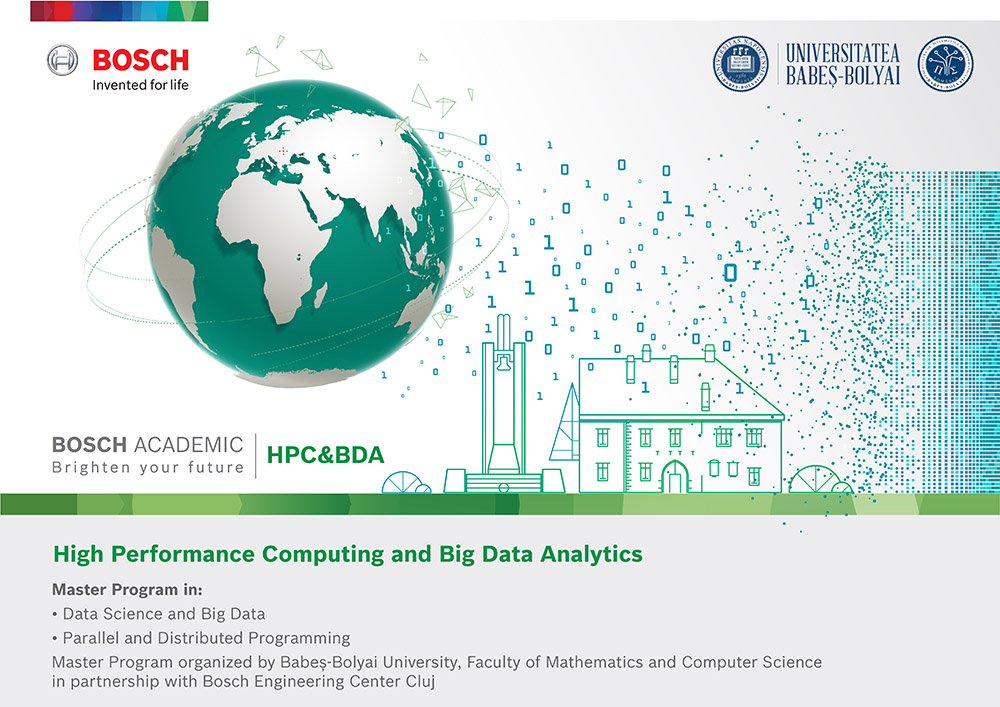| Educational Programme |
High Performance Computing and Big Data Analytics |
| Degree Awarded |
Master in Computer Science |
Standard Length of Studies
(Number of ECTS Credits) |
2 years – 4 semesters – 120 ECTS |
| Type of Study |
Full-time |
| Higher Education Institution |
Babeş-Bolyai University |
| Faculty / Department |
Faculty of Mathematics and Computer Science |
| Contact Person |
Assoc. Professor Virginia Niculescu |
| Phone |
+40 264 405327 |
| Fax |
+40 264 591906 |
| E-mail |
vniculescu@cs.ubbcluj.ro |
| Profile of the Degree Programme |
High Performance Computing and Big Data Analytics degree program |
| Target Group / Addressees |
Graduates in Mathematics, Computer Science, Economics, Electrical/Electronic Engineering, Physics, Chemistry, Biology, etc. |
| Entrance Conditions |
Graduate student recruitment is achieved by competition. The overall three/four-year undergraduate average grade and a personal portfolio, for candidates with a Bachelor Degree in Computer Science, Computer Mathematics or Economical Computer Science and respectively the grade of a written test (see the curricula here) and a personal portfolio, for candidates outside the above mentioned areas. |
| Further Education Possibilities |
The master’s program aims at providing students with the appropriate tools for further doctoral studies and professional activity. |
| Description of Study |
Core disciplines:
- Machine Learning
- Parallel and Distributed Operating Systems
- Formal Modelling of Concurrency
- Advanced Methods in Data Analysis
- Big Data Processing
- Models in parallel programming
- General Purpose GPU Programming
- Workflow Systems
- Data streaming
- Data Mining
- Grid, Cluster and Cloud Computing
- Knowledge Discovery in Wide Area Networks
|
| Purposes of the Programme |
Programme objectives:
- Acquisition of theoretical knowledge in complex systems modelling based on mathematical concepts and methods, and on programming concepts and techniques.
- Acquisition of applicative and practical knowledge. in programming and usage on/of computation systems, especially those of high performance, which are necessary for solving real life problems and for simulating complex problem solutions.
- Acquisition of theoretical, applicative knowledge in exploitation (data-analysis, knowledge-discovering) and visualization of „big data” for computation problems, statistical interpretations, decision processes, or for scientific instruments.
- Acquisition of theoretical, applicative and practical knowledge in applicative scientific domains where high performance systems are used.
- Acquisition of theoretical, applicative and practical knowledge in analysis and improvement of software processes.
- Acquisition of theoretical, applicative and practical knowledge in professional modelling for team work as well as interdisciplinary approaches to research and development.
|
| Specialization / Area of Expertise |
High Performance Computing, Parallel and Distributed Programming, Modelling in Computer Science, Data Analysis. |
| Extra Peculiarities |
Optional: Practice of Education. |
| Practical Training |
In the 2nd year (4th semester) of the program the students participate in a research project and also in an internship in the field of High Performance Computing and Big Data Analytics. |
| Final Examinations |
Dissertation thesis |
| Gained Abilities and Skills |
General competences:
- Advanced knowledge of theoretical, methodological, and practical developments in computer science;
- Systematic use of computer science knowledge to model and interpret new situations, within application contexts larger than the known ones;
- Detailed knowledge and integrated use of conceptual and methodological apparatus pertaining to informatics to provide solutions for incompletely defined situations, to solve new theoretical and practical problems;
- Proficient use of verification, validation, and evaluation criteria and methods to his/her own software solutions, ability to formulate value judgments and to justify/explain constructive decisions;
- Use advanced skills to develop and conduct complex software projects, of practical and/or research nature, using a wide range of quantitative and qualitative methods;
- Advanced communication skills within different professional environments, appropriate use of computer science vocabulary, good English knowledge;
- Team work abilities, assuming different execution and leading roles, performing professional tasks with considerable amounts of autonomy and responsibility.
Specialty competences:
- Capability of developing of high performance programs based on parallel and distributed programming;
- Assimilation of mathematical concepts and formal models to understand the methods and components of high performance systems;
- Analysis, design, and implementation of data analysis systems;
- Understanding and acquisition of methods of modelling, optimization, analysis of massive datasets, data visualization;
- Demonstrate advanced skills to analysis, design, and construction of software systems, using a wide range of hardware / software platforms, programming languages and environments, and modelling, verification and validation tools;
- Demonstrate advanced skills to apply methods for data analysis and processing, data mining, pattern recognition;
- Demonstrate advanced modelling skills for economic, industrial, scientific phenomena and processes;
- Ability to teach students in high schools computer science concepts and theories, provided that the holder of the dissertation diploma owns a graduation certificate of the pedagogical education module.
|
| Job Placement, Potential Field of Professional Activity |
Software companies: analyst, software project/servicesmanager, developer, tester positions.
Universities or research institutions: research assistant, researcher, consultant, academic positions.
Companies with activities in domains that uses high performance computing and big data analytics: software expert. |

 High Performance Computing and Big Data Analytics master presentation
High Performance Computing and Big Data Analytics master presentation





